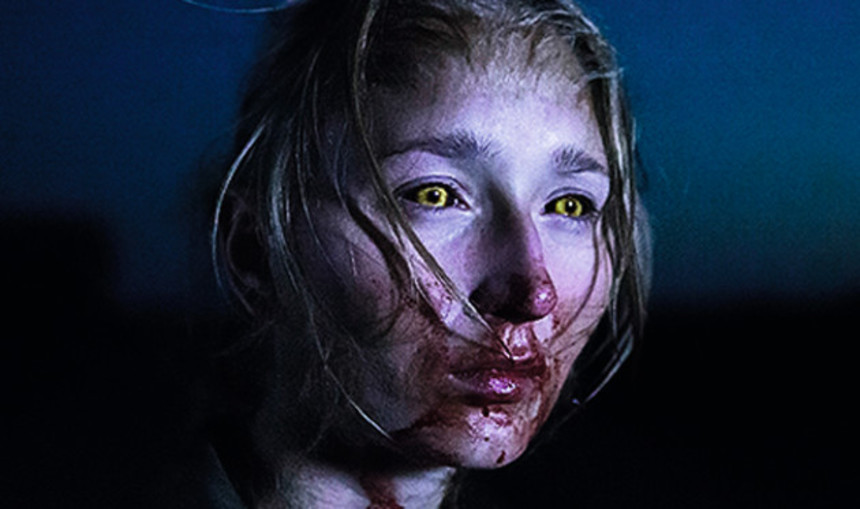Cannes 2014 Review: WHEN ANIMALS DREAM, Stark And Haunting Arthouse Horror

One of the reasons I love genre film is that is gives opportunity to explore the human condition with strange metaphors, allowing the spectator perhaps a deeper and richer understanding than when trying to represent something directly.
Such is the case with Jonas Alexander Arnby's When Animals Dream. Ostensibly a coming-of-age story about a young woman's burgeoning interest in love and sex, it uses the werewolf metaphor to examine how women are often treated when they try to seek their own independent path, especially in small and conservative communities.
Marie (Sonja Suhl, in a terrific performance) lives in a small fishing town on the coast of Denmark. Her mother is an invalid (though no one will tell Marie why), and looked after by Marie and her father (Lars Mikkelsen). Marie has started work at the local fish factory, where she is subjected to seemingly playful and definitely more aggressive pranks and sexual humiliation. When she begins to exhibit some of the same symptoms as her mother, her father and doctor want her to take medication to suppress her 'short temper and aggression'. But she learns that, in fact, she is a werewolf, and Marie has no interest in suppressing anything. However, the villagers have different ideas.
The script by Rasmus Birch is minimalist and often cold, as befits the geographical backdrop of the story. This is a film about aggression: who perpetrates it, who is the victim of it, and who tries to stop it. Being young and beautiful, Marie catches the eye of nice and not-so-nice guys. She seems to know which ones are the good ones, though she is proven wrong once.
One early scene shows Marie being pushed by one of the bad guys, Edsen, into a container of fishheads. When she gets out, she finds herself surrounded by the other factory employees who are applauding; apparently this is a 'good-natured' hazing ritual, but coming after Marie's obvious and aggressive rejection of Edsen, Arnby shows in a tight close-up and circling camera that Marie knows such rituals have a deeper, unkind meaning. Both men and women are aggressors, and Marie begins to see how she is being forced into a passive role. Even someone who should be supporting her, her father, instead passively attempts to control her through medication, as he did with her mother. While this might be for 'her own good', Marie has seen the effect on her mother, and refuses such extremities. She embraces the wolf, and must fight to keep her identity.
This is certainly a starkly beautiful setting for a film, and Arnby uses that to draw out the stark beauty of Marie, both as woman and werewolf. Composer Mikkel Hess' score and mood music (very Mogwai-like) are reminiscent of sounds of the nearby sea, dark, primordial and aggressive, which mirror the rush of blood now flowing more strongly through Marie's changing body. This is mirrored too in the wonderful cinematography; the daytime is harsh and bright, as Marie is exposed, and the nighttime has the kind of darkness only found in rural areas, where any artificial light is almost more dangerous than the shadows.
As Marie attempts to navigate her growing powers and their affect on her body (hair growth, sharp teeth), she finds their power and their seemingly natural place in her form a growing attraction. Indeed, this is one of the most interesting werewolf transformations since An American Werewolf in London, but while that was brutal and painful, Marie's has almost an elegance, a graceful beauty that makes you long to caress her now-growing fur. As her moodiness grows, so grows this fur, and other bodily transformations that she sees no reason to hide. This is in direct violation of some unspoken rule, enforced by men and women alike. There is some violence, but just enough and just surprising and brutal enough to make the audience cringe (in a good way).
At the screening introduction, it was referred to as a 'Protestant' film, with emphasis on the 'protest'. These kind of repressed religious Danish communities have been well represented in film before, but it's nice to see the werewolf trope used to such effect. This is a tremendous feature debut, haunting and elegaic, while not shying away from violence and sex. There is certainly no subtlety to the film; but then again, werewolves aren't meant to be subtle.
When Animals Dream
Director(s)
- Jonas Alexander Arnby
Writer(s)
- Rasmus Birch
- Christoffer Boe (original idea)
- Jonas Alexander Arnby (original idea)
- Rasmus Birch (original idea)
Cast
- Sonia Suhl
- Lars Mikkelsen
- Sonja Richter
- Jakob Oftebro






